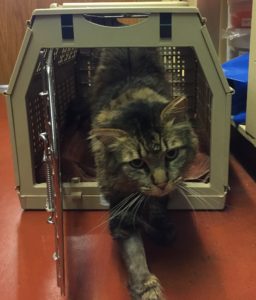The Mystery of Sherlock
Meet Sherlock.

Sherlock is a rather interesting case and highlights the importance of considering unusual diseases when traditional treatments aren’t working. It also shows the importance of Temperance Animal Hospital’s close working relationship with the Emergency Doctors, Internists, Surgeons, and Radiologists at MedVet Toledo in providing you and your pets with the very best medical care available!
Sherlock is an 8 & ½ year old male cat. We first met Sherlock in 2011 when he showed up at his current owner’s house. After an examination, FeLV/FIV testing, parasite treatment, vaccinations, and neutering…Sherlock settled comfortably into his new home. All continued to go well, until spring of 2017.
In March of 2017, Sherlock’s dad took him to MedVet Toledo’s Emergency Room because he had noticed blood dripping from Sherlock’s penis. Initial evaluation and testing suggested that he had penile bruising and Cystitis (inflammation of the bladder). He was treated with a course of antibiotics and appeared to recover normally.
In September of 2017, Sherlock’s dad began to notice a significant change in Sherlock’s personality. He was frequently urinating outside of his litter box, spraying urine on multiple surfaces, howling & vocalizing in the litter box, compulsively trying to get outside, and even becoming aggressive toward his own dad! Diagnostic blood work revealed that Sherlock was metabolically healthy, and the only abnormalities that we could find were changes in the bladder consistent with his previous Cystitis (inflammation of the bladder) condition. He was treated with a 2nd course of antibiotics and pain medication and did well while he was taking the medication. But, within days of stopping the medications his abnormal behaviors returned. At this point, Dr. Smith sat down with Sherlock’s dad and the two of them went over Sherlock’s history with a fine toothed comb….looking for anything that could be triggering a stress-response in Sherlock’s life. The only plausible consideration they could come up with was the recent arrival of a large, white feral cat that frequented Sherlock’s back yard. It is not unusual for indoor cats to show signs of stress when “strangers” approach their home, but Sherlock’s responses admittedly were more intense than typical (especially for a neutered male cat).
October of 2017 began our trials of trying to manage Sherlock’s stress-anxiety levels. In addition to lifestyle modifications at the house, he began to get medications to address his stress-anxiety and bladder pain. However…..in spite of the treatments Sherlock was becoming more and more difficult to manage. He was becoming more aggressive (not even letting his dad administer his medications), continuing to try and escape the house, not eating well, and continuing to urinate/spray everywhere. At his wit’s end, Sherlock’s dad asked us to medically board Sherlock so we could treat him consistently and observe his behavior here.
Sherlock’s time with us at Temperance Animal Hospital ended up being the turning point in discovering his diagnosis and ultimately successfully treating him. The first thing we observed was that while he was very challenging to medicate, Sherlock did not react negatively toward our clinic cats (Eddie and Tommy). They would wander past his cage in the cat ward and Sherlock would come to the front of his cage, sniff, and then ignore them (not the observed behavior to the feral cat at Sherlock’s home!). Could it be that this feral cat was an intact (not neutered or spayed) male/female and the pheromone release was causing the problem? Possibly….but again Sherlock did not have a similar reaction when cats were in the hospital for Spaying or Neutering Surgeries. After he had been here for several days, one of the Animal Caretakers curiously asked Dr. Smith why Sherlock’s urine smelled like “Tom Cat” urine. For those of you who haven’t been around adult male cats who have not been neutered….their urine has a very strong, unique odor! Initially we had assumed the odor was coming from an underlying infection, but a follow-up Urinalysis showed that Sherlock’s infection had resolved. After much brain-storming, Dr. Smith recalled an anatomical fact (you can use this to amaze your friends at your next dinner party!) that the penis of intact male cats has soft-tissue barbs (or spines) while neutered males cats do not. By golly…..when we checked Sherlock’s penis (much to his embarrassment) we found that he did indeed have the characteristic barbs/spines!!!
Reviewing Sherlock’s Medical Record we confirmed that he had a normal Neuter Surgery at our hospital in 2011, so a retained testicle was not a likely cause of his problem. A blood test confirmed our suspicion that Sherlock’s Testosterone hormone levels were much higher than they should be….a neutered male cat should have less than 0.5 ng/mL, while his level was 2.0 ng/mL (consistent with an Intact Male Cat). Some research of medical texts suggested that an Adrenal Gland Abnormality would be the most likely cause for Sherlock’s excess Testosterone. Dr. Smith consulted with Dr. Fry (the Internist at MedVet Toledo) to determine the best way to confirm our suspected diagnosis. She recommended an Abdominal Ultrasound, but suggested that the Radiology Specialist at MedVet Toledo perform the study as Adrenal Gland abnormalities can be subtle and challenging to identify. Thankfully, Dr. Brouwer at MedVet Toledo was able to identify a 1cm growth on Sherlock’s Left Adrenal Gland (hormone gland near the kidneys). Additionally, the remainder of the Abdominal Ultrasound was normal and there were no signs that the mass had spread to any other areas of his body!
A consultation with Dr. Ball (Surgical Specialist at MedVet Toledo) resulted in a plan for Sherlock to have an Abdominal Exploratory with the goal of removing his Left Adrenal Gland. We are happy to report that surgery was a success! Sherlock’s Adrenal Gland was removed and a Pathologist determined that it was an Adrenal Cortical Carcinoma (a cancerous growth). The biopsy further determined that the tumor was confined to the adrenal gland, was completely removed, and did not appear to be highly aggressive in nature….all indications that surgery should be curative.
Due to circumstances in Sherlock’s dad’s life, he was transferred back to T.A.H. for post-operative care. After a few days, it was like Sherlock was a new cat (back to old self)! We rechecked his Testosterone Level two weeks after surgery and it had dropped to <0.1 ng/mL (consistent with a Neutered Male Cat).
We are pleased to report that Sherlock has been home for 2 months now and is continuing to enjoy a happy, healthy and normal life again with his dad. Not only is this a feel-good story about a sick cat that is now healthy, but it shows how teamwork (Pet Parents, Doctors, Nurses, Support Staff, and Specialists) is often vital to the successful outcome of many cases.
-Dr. Smith
